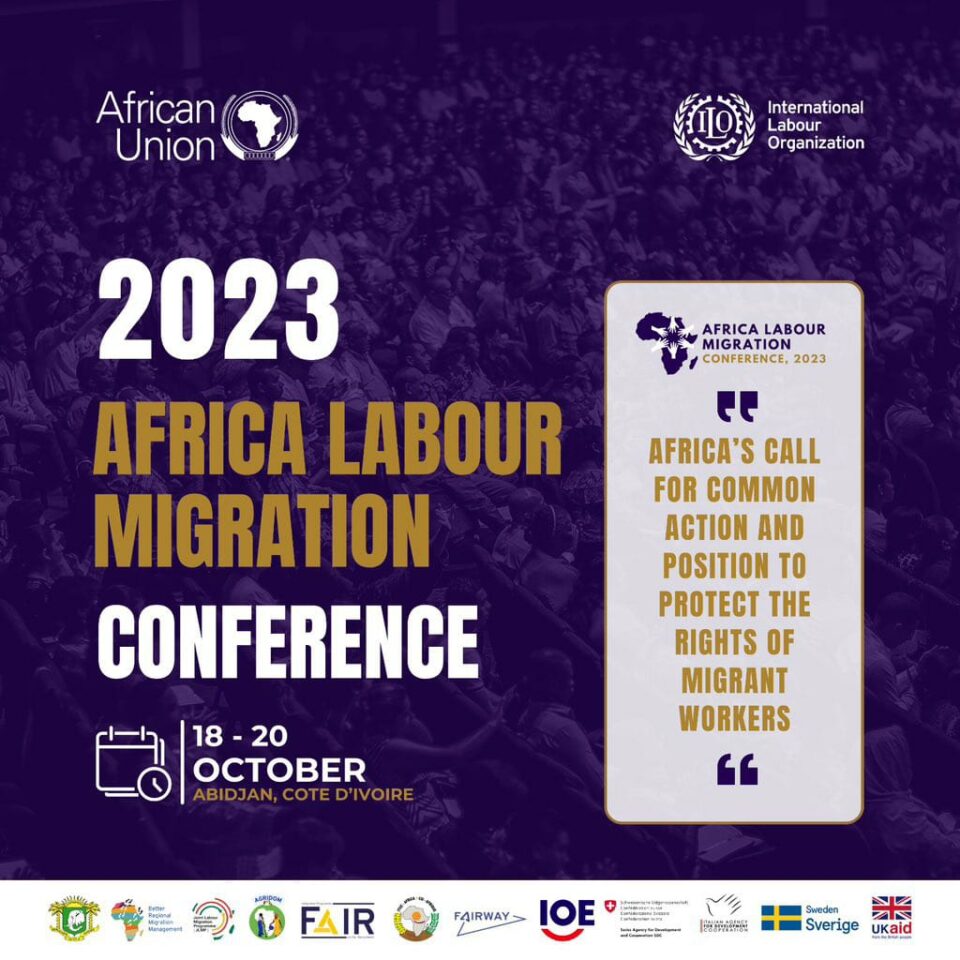By Michael Oche
Delegates from across Africa will beginning from Wednesday, October 18, 2023, converge in Abidjan, the capital of Côte d’Ivoire for the African Labour Migration Conference (ALMC) where they plan to take concrete actions to influence labour migration governance outcomes at regional as well as global levels that will lead to increased protection of African migrant workers.
With a current estimate of 14.5 million migrant workers, the population of African migrant workers is rapidly growing at a rate of 4.8 percent annually, compared to 2.7 percent for the national population.
Despite the benefits of labour migration, our Correspondent reports that poorly governed labour migration by countries within the African continent has reduced opportunities for decent work and increases the risk of labour exploitation of migrant workers, hampering the development potential of labour migration
“The gaps and issues surrounding labour migration primarily stem from ineffective labour migration governance frameworks that are not rights-based, gender responsive, properly resourced or implemented, and the lack of a cohesive approach that considers the lack of economic opportunities in home countries,” a brief from the organisers of the ALMC noted.
As Africa continues to address the relatively low rate of ratification of Labour migration instruments coupled with ineffective implementation and enforcement and reporting on their application by States, a question presents itself – Are African countries making a difference for migrants’ workers, their communities through their interventions?
‘Change the equation’
The organisers of the ALMC agree that there are obvious advantages of adopting a united approach by the AU in dealing with countries of destination compared to individual approaches.
They, however, noted that despite proclamations of good intentions by the authorities, the reality remains that migrant workers’ access to social services and protection systems, and their ability to seek remedy for violations of labour, employment and social rights is limited.
“Most of the challenges faced by migrants in accessing regular labour migration pathways pertain to the fragmentation, inconsistency, and incoherence of legal and policymaking frameworks around migration and labour related issues, across governance scales,” the brief by the organisers noted.
Delegates to the conference, which comprises government officials, trade union leaders and other social partners, will therefore consider some possible elements in a common approach to protect migrant workers’ rights.
These include: agreement to follow common objectives and develop a common Bilateral Labour Agreements (BLA) template with minimum standards; adoption of a common Standard Employment Contract across a region for different categories of workers (domestic workers, construction workers); agreement on minimum wages for categories of workers or by sector: domestic workers; general workers (agriculture, construction, manufacturing, services, etc).
To address these gaps and take a common position, the organisers of the ALMC say the Conference will allow the continent move from discussion to action.
“The conference adopts a solutions-oriented and actions-focused approach from the perspective of Countries of Origin. The conference will reiterate the importance to move from conceptualization, theorizations and broader commitment to concrete actions by identifying implementation deficits/gaps in relation to labour migration governance in the region and agreeing on solutions for joint actions moving forward,” a brief from the organisers noted.
The brief raised several important reasons for developing a common approach to rights based BLAs.
It noted that most existing BLAs have failed to protect migrant workers effectively, adding existing BLA formats with destination countries vary widely without a standard format.
The brief also noted that it is important to prevent unhealthy competition among origin countries that could lead to lower standards of protection.
“There is a pressing need to address poor skill matching of workers with employer demands in countries of destination due to inefficient recruitment processes, lack of mechanisms for skills recognition and non-availability of required information,” the brief noted.
At the end of the conference, it is hoped that each member country, Regional Economic Communities (REC) and social partners will identify three actions (not new, but already endorsed actions) they commit to implement as part of the campaign to foster implementation towards results (conventions, LM policies, protocols)
It would also among other things lead to a collection of promising practices by countries to promote effective labour migration governance which will be compiled and shared with the view for further dissemination by ILO and AUC.
The ALMC is convened by the African Union Commission (AUC), in collaboration with ITUC-Africa and International Organization of Employers (IOE) with technical support from the International Labour Organization (ILO).



